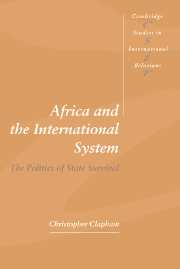Book contents
- Frontmatter
- Contents
- Acknowledgements
- List of acronyms and abbreviations
- Part I African states and global politics
- 1 Fragile states and the international system
- 2 The creation of an African international order
- 3 Domestic statehood and foreign policy
- Part II Patterns of alliance
- Part III Struggling with decay
- Notes
- Bibliography
- Index
- CAMBRIDGE STUDIES IN INTERNATIONAL RELATIONS 50
1 - Fragile states and the international system
Published online by Cambridge University Press: 09 October 2009
- Frontmatter
- Contents
- Acknowledgements
- List of acronyms and abbreviations
- Part I African states and global politics
- 1 Fragile states and the international system
- 2 The creation of an African international order
- 3 Domestic statehood and foreign policy
- Part II Patterns of alliance
- Part III Struggling with decay
- Notes
- Bibliography
- Index
- CAMBRIDGE STUDIES IN INTERNATIONAL RELATIONS 50
Summary
Introduction
This book attempts to examine the workings of international politics from the viewpoint of a group of states - and in some degree their people - which are at the bottom of any conventional ordering of global power, importance and prestige. International relations has tended, understandably enough, to look at the world from the viewpoint of its most powerful states. It has been developed as a subject of study in the major capitalist states, and has been directed largely towards helping them to manage the demands of an increasingly complex international system - most obviously through the avoidance of war, but also through the management of the global economy and in other ways. Its dominant focus during the era of the Cold War was on the relationship between the superpowers, with a secondary but still important emphasis on relations between other industrial states such as those of Western Europe. Even the study of ‘north-south’ relations characteristically had a heavy emphasis on north-south relations, often within the context of superpower competition, rather than on southnorth ones.
Yet most of the world's states - and in the context of this book, notably those of sub-Saharan Africa - are poor, weak and subordinate. Most of the people in them are poorer, weaker and more subordinate still. International politics affects these states and people in ways that often differ appreciably from the ways in which it affects the people and governments of more powerful states.
- Type
- Chapter
- Information
- Africa and the International SystemThe Politics of State Survival, pp. 3 - 27Publisher: Cambridge University PressPrint publication year: 1996
- 1
- Cited by

